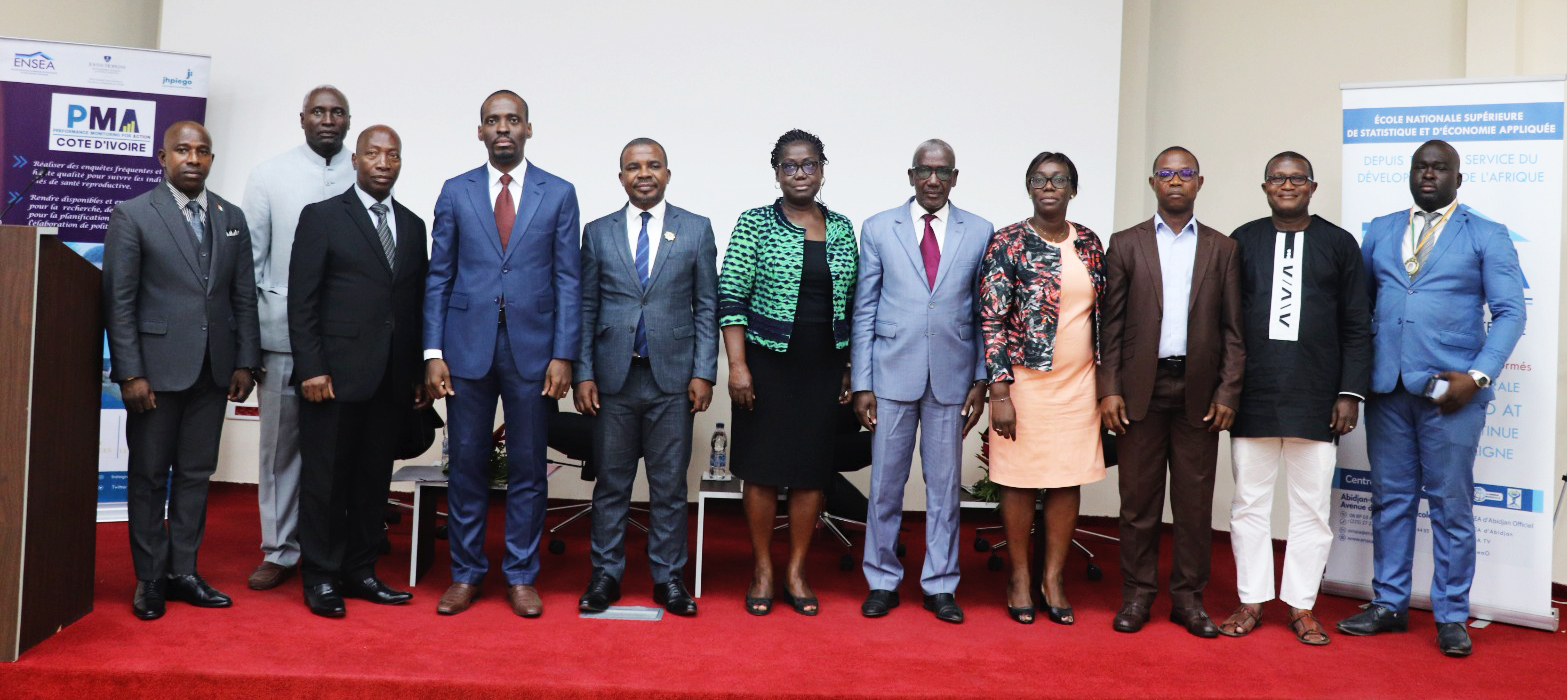
The École Nationale Supérieure de Statistique et d’Économie Appliquée (ENSEA) has been running a project called “Performance Monitoring for Action” (PMA) since July 2019 with financial support from the Bill & Melinda Gates Foundation n. The project is being implemented with technical support from the Bill & Melinda Gates Institute for Population and Reproductive Health. The objective of the PMA project is to advance knowledge of contraceptive dynamics and reproductive health at a programmatic level.
PMA implements cross-sectional surveys and a longitudinal panel of women and health service sites. The information collected by these panel surveys is not currently measured by other large-scale surveys. The panel design provides unique information by allowing researchers to measure and examine changes in women over time, information that is useful to planners and policy makers in understanding the demand for and uptake of new contraceptive methods. The data is freely available for research, programme planning and policy development.
The project will be implemented in two phases between 2020 and 2021. The first phase of baseline data collection from households, women, health delivery sites and clients of family planning services was carried out from September to November 2020, followed by a follow-up survey in March 2021. The second phase ran from September to December 2021, with a telephone follow-up survey of FP clients carried out in May 2022. The study is being conducted in one hundred and twenty-two (122) nationally representative enumeration areas (EAs) in Côte d’Ivoire, according to place of residence.
In accordance with the project schedule, the third data collection phase was carried out 12 months after the baseline survey in the previous phase. As with phase 2, the third phase was a combination of a cross-sectional survey of a sample of 35 households per enumeration zone, a follow-up survey of panel women recruited during phases 1 and 2 of the data collection, and a survey of the SPSs serving the DZs.
These operations made it possible to obtain information from women aged 15-49 on the demand for and use of contraceptive methods and on contraceptive dynamics, and to obtain information on the supply and quality of service from the health facilities serving the areas covered by the study. The study also generated quantitative data on gender-based violence within households.
With a view to popularising the results of these surveys, a workshop was held at ENSEA on 17 August 2023 to disseminate the results nationwide. In order to ensure broad coverage of the various stakeholders during this dissemination, the workshop was held in a hybrid format (face-to-face and online on Zoom).
The overall aim of the workshop was to present the main results of phase 3 of the project and of the module on gender-based violence, and also to encourage greater appropriation of the survey data at national level. It was attended by :
The Ivorian government, represented by :
– (the representative of the Director General of Health) and the Health Coverage Insurance Company;
– The National Assembly
– The Ministry of Youth
Decision-makers in family planning and reproductive health;
– development partners;
– experts from the scientific community and civil society;
– and finally, the members of the Monitoring Advisory Committee (CCS).
The ceremony was marked by a number of highlights, including speeches of:
– The official presentation of the study results briefs to the authorities and participants;
– Presentation of the overall results of phase 3 and the module on gender-based violence;
– Discussions on the results.
The results presented include the following:
– The modern contraceptive prevalence rate (mCPR) among women in union has risen from 19% in 2017 to 27% in 2022.
– The mCPR among young girls aged 20-24 is rising, from 27% (2021) to 35% (2022).
– The proportion of users of long-acting contraceptive methods is increasing: 7% in 2022 compared with 3% in 2017.
– Unmet need for family planning is falling, from 26% in 2017 to 17% in 2022. These needs are mainly for birth spacing rather than birth limitation.
– The proportion of unwanted pregnancies falls from 43% in 2021 to 40% in 2022. Most of the women who did not want the recent or current pregnancy have primary education or have never attended school (72%).
– Of the women using a modern method at the time of the survey, 79% had discussed the decision to delay or avoid pregnancy with their partner.
– Only 23% of women who receive the four key messages that make up good quality FP advice have discussed the decision with their partner.
– More than one in five women aged 20-24 had discussed family planning with a provider in the 12 months preceding the survey. However, adolescent girls are half as likely to have had these discussions.
– Just under a third of health delivery sites (HDS) offering implants do not have trained providers and/or the necessary equipment for implant insertion and removal. For SPS offering the IUD, this rate is 52%.
– The prevalence of physical and/or sexual violence suffered by women at the hands of their intimate partner is high (11%) but down on the results of phase 2 (14%).
– Only 29% of women who had suffered sexual violence had sought help, and in only 4% of cases had they done so through a formal structure.
– Physical and/or sexual violence perpetrated by an intimate partner is more common among teenage girls (15-19 years, 14%).
The following recommendations emerge from these results:
Recommendations relating to family planning
– Increase awareness among couples, focusing on men, of the benefits of family planning for the well-being of the family.
– Strengthen or adapt awareness-raising content and approaches.
– Review person-centred counselling approaches.
– Build the capacity of counselling providers.
– Use e-health platforms to inform adolescents and young people about family planning.
– Pass a law allowing providers to supply contraceptive methods to adolescents.
– Build the capacity of on-site providers through mobile clinics.
– Make the necessary materials available at all sites.
– Monitor orders and supplies.
Recommendations relating to gender-based violence (GBV)
– Increase awareness of the laws against GBV.
– Raise community awareness of the importance of reporting GBV and the various means of redress.
– Strengthen awareness-raising campaigns on GBV.
– Raise couples’ awareness of how to manage domestic conflicts.
– Build the capacity of leaders and adolescent girls to avoid early marriage.
All these results and those from previous phases of the PMA survey are freely available on www.pmadata.org

